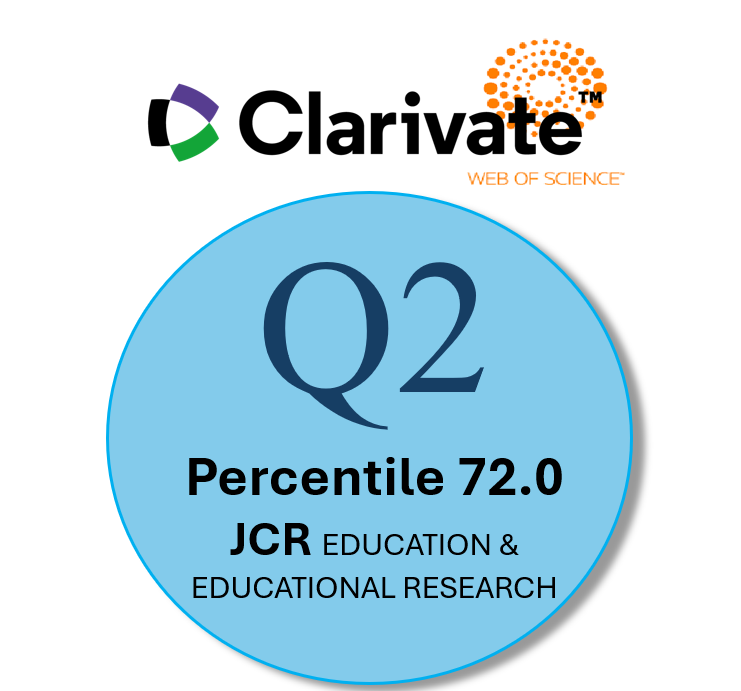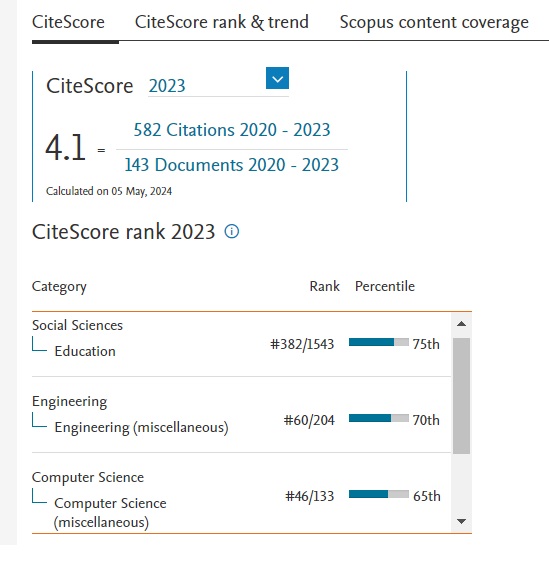Orientación para el aprendizaje colaborativo apoyado en wiki y construcción de conocimiento comunitario para una clase completa: Cómo mejorar los entornos de aprendizaje durante la pandemia COVID19
Resumen
El propósito de este estudio es desarrollar una teoría instruccional para el aprendizaje colaborativo apoyado por wiki en el contexto de proyectos de pequeños grupos para el desarrollo del conocimiento colaborativo en cursos de pregrado. El documento presenta la teoría instruccional desarrollada a través de dos implementaciones y analiza cómo esta teoría puede enriquecer el aprendizaje independientemente de las limitaciones durante la pandemia del COVID19, en la que las reuniones de grupos pequeños son posibles pero las reuniones de clases grandes se trasladan a educación en línea.
Aunque, en teoría, los wikis deberían ser una tecnología poderosa para apoyar el aprendizaje colaborativo, la investigación empírica revela desafíos con respecto a la motivación del estudiante, la dinámica de grupo y la evaluación. Para cerrar las brechas entre la teoría y la práctica, utilizamos el enfoque de investigación basado en el diseño (DBR) y colaboramos con dos profesionales expertos para desarrollar la teoría de la instrucción. El proceso de investigación incluye una teoría inicial, implementaciones en dos casos y refinamiento de la teoría. La recopilación y el análisis de datos incluyen la revisión de la literatura, múltiples entrevistas individuales con expertos antes y durante las implementaciones, observaciones semanales de la clase, entrevistas de grupos focales con los estudiantes durante la implementación, análisis de contenido de los wikis de la clase y entrevistas de grupos focales con expertos para perfeccionar la teoría.
Los resultados del estudio presentado en este documento se centran en la construcción de una teoría instruccional refinada, que a su vez se basa en el trabajo teórico, el conocimiento heurístico de los instructores expertos y la eficacia local. Además, este documento incluye principios de diseño con algunas consideraciones para apoyar el aprendizaje en entornos COVID19.
En otras palabras, el éxito de usar wikis para fomentar una cultura de compartir y para aumentar la motivación y participación de los estudiantes en el trabajo de proyectos individuales o grupales, así como en la construcción de conocimiento comunitario para toda una clase, puede enriquecer el aprendizaje durante la pandemia al crear entornos de aprendizaje centrados en el alumno, en el conocimiento, en la evaluación y en la comunidad.
Descargas
Citas
Bereiter, C. (2002). Design research for sustained innovation. Cognitive Studies, Bulletin of the Japanese Cognitive Science Society, 9(3), 321–327. Retrieved from http://ikit.org/fulltext/2002Design_Research.pdf
Berthoud, L. & Gliddon, J. (2018). Using wikis to investigate communication, collaboration and engagement in Capstone engineering design projects. European Journal of Engineering Education, 43(2), 247-263. doi: 10.1080/03043797.2017.1332574
Bold, M. (2006). Use of wikis in graduate course work. Journal of Interactive Learning Research, 17(1), 5-14. Retrieved from http://www.aace.org/pubs/jilr/
Bonk, C. J., Lee, M. M., Kim, N., & Lin, M.-F. (2010). Wikibook transformations and disruptions: Looking back twenty years to today. In H. H. Yang, & S. C-Y. Yuen (Eds.), Collective intelligence and e-learning 2.0: Implications of web-based communities and networking (pp.127-146). Hershey, PA: Information Science Reference.
Bruning, R. H., Schraw, G. J., Norby, M. M., & Ronning, R. R. (2003). Problem solving and critical thinking. Cognitive psychology and instruction (4th ed.). Upper Saddle River, NJ: Pearson.
Cole, M. (2009). Using wiki technology to support student engagement: Lessons from the trenches. Computers & Education, 52(1), 141-146. doi:10.1016/j.compedu.2008.07.003
Design-Based Research Collective. (2003). Design-based research: An emerging paradigm for educational inquiry. Educational Researcher, 32(1), 5-8. doi:10.3102/0013189X032001005
de Pedro Puente, X. (2007). New method using wikis and forums to evaluate individual contributions in cooperative work while promoting experiential learning: Results from preliminary experience. Paper presented at the International Symposium on Wikis, Montreal, Quebec, Canada.
de Pedro, X., Rieradevall, M., López, P., Sant, D., Piñol, J., Núñez, L., et al. (2006a). Writing documents collaboratively in higher education using traditional vs. wiki methodology (I): QUALITATIVE results from a 2-year project study. Paper presented at the 4th International Congress of University Teaching and Innovation (IV CIDUI).
Retrieved from http://uniwiki.ourproject.org/Article+Wikis
de Pedro, X., Rieradevall, M., López, P., Sant, D., Piñol, J., Núñez, L., et al. (2006b). Writing documents collaboratively in higher education using traditional vs. wiki methodology (II): QUANTITATIVE results from a 2-year project study. Paper presented at the 4th International Congress of University Teaching and Innovation (IV CIDUI).
Retrieved from http://uniwiki.ourproject.org/Article+Wikis+2
Elgort, I., Smith, A. G., & Toland, J. (2008). Is wiki an effective platform for group course work? Australasian Journal of Educational Technology, 24(2), 195-210. Retrieved from http://www.ascilite.org.au.ezproxy.lib.indiana.edu/ajet/submission/index.php/AJET/index
Garrison, D. R., & Akyol, Z. (2009). Role of instructional technology in the transformation of higher education. Journal of Computing in Higher Education, 21(1), 19-30. doi:10.1007/s12528-009-9014-7
Hemmi, A., Bayne, S., & Land, R. (2009). The appropriation and repurposing of social technologies in higher education. Journal of Computer Assisted Learning, 25(1), 19-30. doi:10.1111/j.1365-2729.2008.00306.x
Johnson, D. W., & Johnson, R. T. (1989). Cooperation and competition: Theory and research. Edina, MN: Interaction Book Company.
Lee, J.-Y., & Reigeluth, C. M. (2003). Formative research on the heuristic task analysis process. Educational Technology Research and Development, 51(4), 5-24. doi:10.1007/BF02504541
Lee, J.-Y., & Reigeluth, C. M. (2009). Heuristic task analysis on e-learning course development: A formative research study. Asia Pacific Education Review, 10(2), 169-181. doi:10.1007/s12564-009-9016-1
Lin, C.-Y. (2013). Instructional theory for using a class wiki to support collaborative learning in higher education (Doctoral dissertation). Indiana University Bloomington, IN. http://search.proquest.com/docview/1362257949
Lin, C.-Y., & Reigeluth, C. M. (2016). Scaffolding wiki-supported collaborative learning for small-group projects and whole-class collaborative knowledge building. Journal of Computer Assisted Learning, 32(6), 529-547. https://doi.org/10.1111/jcal.12140
Lin, C.-Y., & Reigeluth, C. M. (2019). Scaffolding learner autonomy in a wiki-supported knowledge building community and its implications for mindset change. British Journal of Educational Technology, 50(5), 2667-2684. https://doi.org/10.1111/bjet.12713
Matthews, R. S., Cooper, J. L., Davidson, N., & Hawkes, P. (2003). Building bridges between cooperative and collaborative learning. In J. L. Cooper, P. Robinson & D. Ball (Eds.), Small group instruction in higher education: Lessons from the past, visions of the future. Stillwater, Okla: New Forums Press.
Nichols, J. D., & Miller, R. B. (1994). Cooperative learning and student motivation. Contemporary Educational Psychology, 19(2), 167-178. doi:10.1006/ceps.1994.1015
Panitz, T. (1996). A definition of collaborative vs. cooperative learning. Retrieved fromhttp://www.londonmet.ac.uk/deliberations/collaborative-learning/panitz-paper.cfm
Reigeluth, C. M. (1999a). The elaboration theory: Guidance for scope and sequence decisions. In C. M. Reigeluth (Ed.), Instructional-design theories and models: A new paradigm of instructional theory (Vol. 2, pp. 425-453). Mahwah, NJ: Lawrence Erlbaum.
Reigeluth, C. M., Lee, J.-Y., Peterson, B., & Chavez, M. (2000). Formative research on the heuristic task analysis. ERIC Document Reproduction Service. (ED455788). Retrieved from http://eric.ed.gov/ERICWebPortal/search/detailmini.jsp?_nfpb=true&_&ERICExtSearch_SearchValue_0=ED455788&ERICExtSearch_SearchType_0=no&accno=ED455788
Robertson, I. (2008). Learners' attitudes to wiki technology in problem based, blended learning for vocational teacher education. Australasian Journal of Educational Technology, 24(4), 425-441. Retrieved from http://www.ascilite.org.au/ajet/submission/index.php/AJET/index
Rienties, B., Tempelaar, D., Van den Bossche, P., Gijselaers, W., & Segers, M. (2009). The role of academic motivation in computer-supported collaborative learning. Computers in Human Behavior, 25(6), 1195-1206. doi:10.1016/j.chb.2009.05.012
Saunders, W. M. (1989). Collaborative writing tasks and peer interaction. International Journal of Educational Research, 13(1), 101-112. doi:10.1016/0883-0355(89)90019-0
Schacht, P. (2007). The collaborative writing project. In S. Mader (Ed.), Using wiki in education (pp. 12-23). Retrieved from http://www.google.ca/url?sa=t&source=web&cd=14&ved=0CC8QFjADOAo&url=https%3A%2F%2Fwiki.umontreal.ca%2Fdownload%2Fattachments%2F3693%2FUsingWikiInEducation_StewartMader.pdf&rct=j&q=using%20wiki%20in%20education&ei=qEpQTYT2GtDSgQftnKH0Dw&usg=AFQjCNG4eTozTgRngdiFCASNXvgANyFWfA&sig2=aguDIpnNWdgVUEp5v_1b5g&cad=rja
Trocky, N. M., & Buckley, K. M. (2016). Evaluating the impact of wikis on student learning outcomes: An integrative review. Journal of professional nursing, 32(5), 364-376. doi: 10.1016/j.profnurs.2016.01.007
Wang, F., & Hannafin, M. J. (2005). Design-based research and technology-enhanced learning environments. Educational Technology Research and Development, 53(4), 5-23. doi:10.1007/BF02504682
West, J. A., & West, M. L. (2009). Using wikis for online collaboration: The power of the read-write Web (1st ed.). San Francisco: Jossey-Bass.
UNESCO (2020). Culture & COVID-19: Impact and response tracker. Retrieved
from https://en.unesco.org/news/culture-covid-19-impact-and-response-tracker
- 09-01-2021 (2)
- 08-01-2021 (1)
-
Resumen2213
-
PDF 1342
Derechos de autor 2020 Revista de Educación a Distancia (RED)

Esta obra está bajo una licencia internacional Creative Commons Atribución-NoComercial 4.0.
Las obras que se publican en esta revista están sujetas a los siguientes términos:
1. El Servicio de Publicaciones de la Universidad de Murcia (la editorial) conserva los derechos patrimoniales (copyright) de las obras publicadas, y favorece y permite la reutilización de las mismas bajo la licencia de uso indicada en el punto 2.
2. Las obras se publican en la edición electrónica de la revista bajo una licencia Creative Commons Reconocimiento-NoComercial-SinObraDerivada 3.0 España (texto legal). Se pueden copiar, usar, difundir, transmitir y exponer públicamente, siempre que: i) se cite la autoría y la fuente original de su publicación (revista, editorial y URL de la obra); ii) no se usen para fines comerciales; iii) se mencione la existencia y especificaciones de esta licencia de uso.
3. Condiciones de auto-archivo. Se permite y se anima a los autores a difundir electrónicamente las versiones pre-print (versión antes de ser evaluada) y/o post-print (versión evaluada y aceptada para su publicación) de sus obras antes de su publicación, ya que favorece su circulación y difusión más temprana y con ello un posible aumento en su citación y alcance entre la comunidad académica. Color RoMEO: verde.















